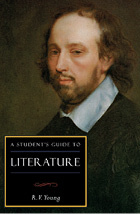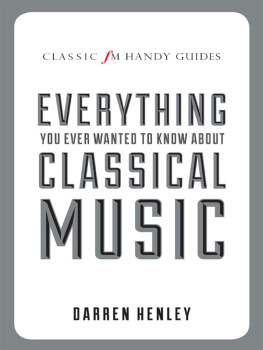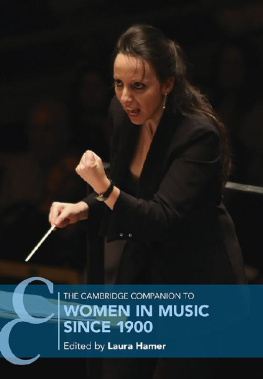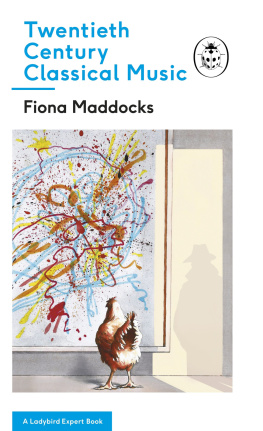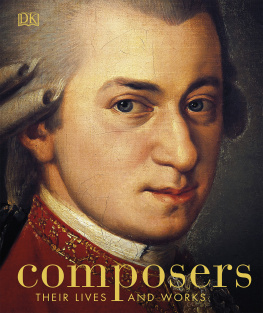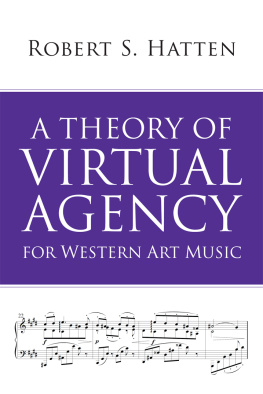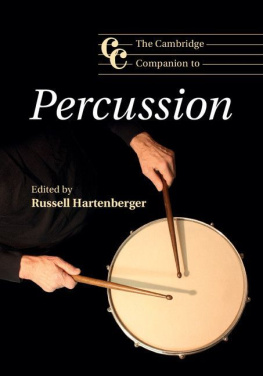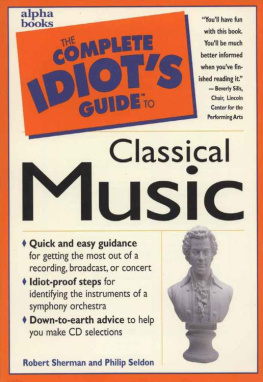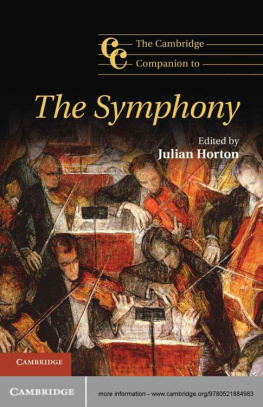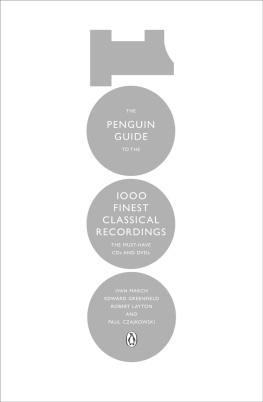The Penguin Companion to Classical Music
Paul Griffiths

PENGUIN BOOKS
PENGUIN BOOKS
Published by the Penguin Group
Penguin Books Ltd, 80 Strand, London WC2R 0RL , England
Penguin Group (USA) Inc., 375 Hudson Street, New York, New York 10014, USA
Penguin Books Australia Ltd, 250 Camberwell Road, Camberwell, Victoria 3124, Australia
Penguin Books Canada Ltd, 10 Alcorn Avenue, Toronto, Ontario, Canada M4V 3B2
Penguin Books India (P) Ltd, 11, Community Centre, Panchsheel Park, New Delhi 110 017, India
Penguin Group (NZ), cnr Airborne and Rosedale Roads, Albany, Auckland 1310, New Zealand
Penguin Books (South Africa) (Pty) Ltd, 24 Sturdee Avenue, Rosebank 2196, South Africa
Penguin Books Ltd, Registered Offices: 80 Strand, London WC2R 0RL , England
www.penguin.com
First published 2004
1
Copyright Paul Griffiths, 2004
All rights reserved
The moral right of the author has been asserted
Except in the United States of America, this book is sold subject to the condition that it shall not, by way of trade or otherwise, be lent, re-sold, hired out, or otherwise circulated without the publishers prior consent in any form of binding or cover other than that in which it is published and without a similar condition including this condition being imposed on the subsequent purchaser
for Bruce Phillips
Contents
Preface
This book offers keys to one of the great memory banks our species has devised for itself: a store of thoughts and feelings, logical processes and fantasies, messages and enigmas, jokes and outbursts, all of which may be converted again and again from markings on paper into sound. Boundaries of time and space are crossed. Inscriptions made perhaps centuries ago become sensuous vibrations happening right now, through our voices as singers, under our fingers as players, inside our heads as listeners. From origins in a small area at a remote period Europe in the Middle Ages has come a universal music.
The borderlands of this music are hazy, touching on aural heritages of song, dance and sacred chant, on musical civilizations that developed independently and, since the beginning of the 20th century, on new forms of popular music transmitted round the world by electronic means. Its centre, though, is strong. Because it is notated, and because its notation is always open to interpretation, this music remains alive. Any composition is unfinished. It is not even finished when it is performed. Nor is it over when it has been heard and understood, for there will always be the possibility of a new hearing and a new understanding a new hearing and a new understanding that some will want to put into compositions of their own.
This music, unfolding in ever-increasing richness and diversity from the development of accurate notation that began a thousand years ago, is what we know as classical, to use the epithet that has become unavoidable and also unfortunate if it erects boundaries, arouses pretensions or, worst of all, suggests a shelf of works all more than a century old and irrelevant except as objects of veneration. On the contrary, the classics invite our participation, not our worship. We can all, now, be emboldened by Beethovens hope, follow the struggles with multi-dimensional puzzles of melody, rhythm and harmony made by Machaut or Ligeti, feel the poignancy of a moment in Debussy, Schubert or Kurtg, share a joke with Haydn or Babbitt. Moreover, great works are still being written, and will go on being written. This music connects us with the past, certainly, but also with ourselves and with each other.
The classics live, too, in that they change. Half a century ago a book such as this would have barely considered music more than 300 years old: Bach and Handel marked the starting point, with Corelli, Purcell and a few others the upbeat to that beginning. A coherent view of the tradition could thereby be maintained, of an evolving principle of organic form developed largely by composers in Austro-German lands Bachs sons, Haydn, Mozart, Beethoven, Schubert, Mendelssohn, Schumann, Brahms, Bruckner, Mahler, Strauss, Schoenberg until it was challenged by modernist outsiders: Debussy and Stravinsky.
But if this view remains central to our notion of what classical music is, much more has been added. In the concert hall and on record we can now meet the music not of three centuries but of ten, and the repertory has been amplified too in its breadth, with the emphatic arrival of, for instance, French Baroque music and the reconsideration of innumerable lesser and marginal composers. In effect the revolution of modernism, which upset all stabilities, has been completed in our relationship with the past. We now live in a much more complex musical world, in which the great river of the Austro-German tradition is only one of the waterways. To keep the image, this book is an aid to navigation.
What has also changed, especially since the introduction of the CD, is the variety of ways in which classic works can be heard. Current catalogues list, for example, over 200 available versions of Beethovens Fifth Symphony, including 10 conducted by Wilhelm Furtwngler alone. Where recordings once served as piano arrangements did before them to familiarize people with works belonging in the concert hall, now they exist as achievements in their own right, to the extent that the live experience of music may seem irrelevant.
But it is not. Live music has irreplaceable virtues, not only in being unpredictable and unrecapturable but also in providing a richness of sound that no recording, still, can quite come near. Live music involves the listener, too, in an effort that joins performers and audience in concentration.
That they will go on engaging such concentration, time and again, is one of the conditions of classic works. They remain classics not just by 19th-century dictate (though indeed the notion of classical music began then) but also because generations have found them of personal and social value. Not the least of their values, in a culture of speed and the eye, is in their encouragement of sustained attention and their education of the ear. They also, in a world where the individual is primary, offer the comforts and challenges of community: the community of musicians taking part in a performance, of traditions in any score or realization, of notes in whatever the piece may project as harmony, of listeners. Our journeys through a work or through our lives of listening and, if we will, performing form strands in a counterpoint of millions.
For each of us the journey is an individual endeavour, part of a life of discovery and self-discovery, connection and self-connection. But we are enmeshed, too, in that multi-millionfold counterpoint, and dependent on cultural responsibilities that have to be widely shared. Music requiring performers with rare qualities, whom we naturally want to prize for their rareness, is expensive. Music whose values are not generally commercial has always needed support, from rulers or the rich.
Such music is therefore vulnerable, for all its scale and diversity, and especially vulnerable in a culture that prefers the celebrated (in this case venerated works and acclaimed recordings) to the unmeasured (new works, live music), and that has fine measures for cost but none for value. Value has to be simply affirmed, and proved by experience. Let it be so. Listening is as important as reading. Because it comes as direct sense experience, unmediated by the analysis that words must arouse, music may even be more important than literature, addressing not only the selves we have constructed but the deepest urges of body and mind. An education that excludes music is a poor training for life. A life that excludes music is unimaginable.


